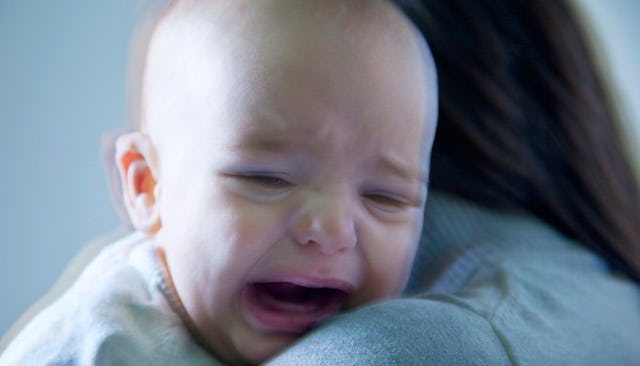I Was A Newly Motherless New Mother

I was lying next to my mother, dwarfing her withered body with my giant eight-month pregnant belly when she died. I dragged myself to an ultrasound appointment the next morning, desperate to confirm that there was still life inside of me when everything pointed to the contrary. My mother’s body was being removed from my parents’ home as the doctor pulled a grainy image up on the screen, showing a big, thriving baby in ready position.
I was 26 when my mom called to tell me that she had been diagnosed with cancer and given three to six months to live. After a bizarre moment during which I hyperventilated and let my roommate’s repetitive monotone exclamation (“It’s so awful, it’s so awful, it’s so awful”) lull me into a dissociative stupor, my first thought was that my mom would not get to have grandchildren, that my children would never know her. Twenty-four hours later, I had dropped out of my nearly completed graduate program and moved across the country, back into my childhood bedroom. My mom was still alive three years later when I got pregnant, but barely.
As I grew and gained, my mom shrank and lost. First she lost her hair, her eyelashes and eyebrows. Then she lost pounds—an ungodly number of pounds—and her fingernails and the color in her skin. Meanwhile, my skin was starting to look really fantastic. My hair thickened and shone, and my nails grew at an alarming rate. Sometime during my second trimester, my mom lost the abilities to breathe and walk unassisted. It was torturous to see her looking so childlike and helpless, especially at a time in my life when I needed her to be my grown-up more than ever.
On a conscious level, I never really let myself think that my mom was going to make it to the birth of my son. But every week that I was still pregnant and she was still alive, a perilous globule of hope slowly amassed. She suffered for longer than she should have because she wanted so badly to meet her first grandchild.
Infancy and early childhood aside, I have never needed my mom as much as I did when my son was born. Her absence was (and often still is) throbbing and unbelievable. Every moment of joy with my son is attenuated by the fact that she cannot share in it. I want to send her videos of my son having giggle attacks, of him kissing our big, dirty dog on the mouth. Videos that she (infuriatingly and adorably) would have no idea how to watch (“Sweetie, I opened your email but I don’t see the video. An attachment? Where do I click? Nothing is happening…”). I want to ask her what I was like as a baby and what she did with me. I want to forgive her for so many things that I couldn’t have understood before becoming a mother.
I’ve never understood her more or felt closer to her.
When my mother died, people understandably wanted to make me feel better about the fact that she didn’t get to meet my son. They said things like, “They may not have met in the flesh, but they did meet,” and “She’ll live on through Theo.” Circle of life, blah blah, and so on. They made exaggerated attempts to point out a physical likeness. I appreciated these sentiments, but they certainly didn’t make me feel better. I am nonreligious, so I wasn’t comforted by the conviction that my mom and son had met or would meet in another realm. Similarly, I didn’t feel that Theo’s coloring and round face connected him in any meaningful way to my mother.
What no one ever said, but what feels most true to me, is that my mother lives on through my mothering. My mom and I were never a look-alike, best-girlfriends type of mother-daughter pair. We were quite different in many ways. But now that she is gone and I am a mother, I feel her presence within me more than ever. I am the mother that I am because of her; I can love as much as I do because of her. And my son feels that. He knows her love.
For months after Theo was born, I had vivid recurring dreams about failed attempts to join him with my mom. In waking life, reminders of her absence are numerous and jarring. Occasionally, I completely forget that she’s not alive. I cherish these ephemeral moments when I think for a split second that I can call to tell her Theo just took his first steps, because maybe one day I’ll know and feel that she is really gone.
This article was originally published on